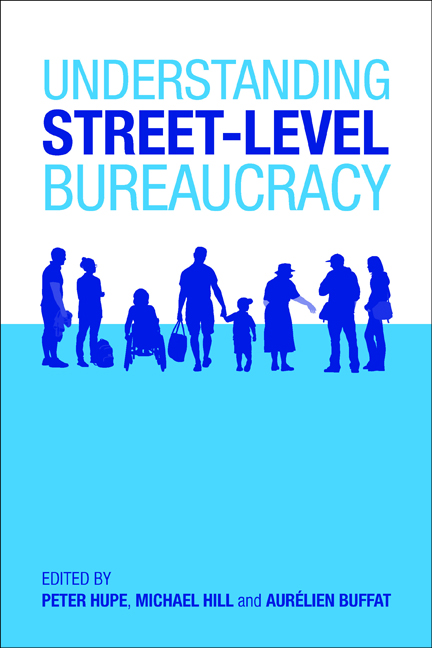Book contents
- Frontmatter
- Contents
- Biographical notes
- Preface
- Part One Introduction
- Part Two Delivering services and benefits: street-level bureaucracy and the welfare state
- Part Three Agents of the state: street-level bureaucracy and law enforcement
- Part Four Embedded in society: street-level bureaucrats as public actors
- Part Five The management of street-level bureaucrats
- Part Six The promise of professionalism
- Part Seven Conclusion
- References
- Index
Four - Street-level bureaucracy and professionalism in health services
Published online by Cambridge University Press: 08 March 2022
- Frontmatter
- Contents
- Biographical notes
- Preface
- Part One Introduction
- Part Two Delivering services and benefits: street-level bureaucracy and the welfare state
- Part Three Agents of the state: street-level bureaucracy and law enforcement
- Part Four Embedded in society: street-level bureaucrats as public actors
- Part Five The management of street-level bureaucrats
- Part Six The promise of professionalism
- Part Seven Conclusion
- References
- Index
Summary
Introduction
At the heart of Lipsky's analysis is the observation that the workers whom he terms ‘street-level bureaucrats’ exercise considerable discretion over core aspects of their work. Thus, for instance, it is police officers that ‘decide who to arrest and whose behaviour to overlook.… Teachers decide who will be suspended and who will remain in school, and they make subtle determinations of who is teachable’ (Lipsky, 1980, p 13).
From one perspective, this is just as it should be; Lipsky comments that, ideally, street-level bureaucrats respond to the needs of individual clients, and, indeed, may espouse this approach as a personal and professional value (Lipsky, 1980, p xii). However, this ideal is not achieved in practice; inadequacy of agency resources leads street-level bureaucrats to develop techniques for mass processing clients, the results of which may be benign but may sometimes result in ‘favouritism, stereotyping and routinizing’ (Lipsky, 1980, p xii). Lipsky (1980, pp 9, xii, 8) observes that this behaviour is ‘far from the bureaucratic ideal’ of hierarchical control since it effectively becomes agency policy, and concludes that ‘street-level bureaucrats must be dealt with if policy is to change’. In this context, ‘dealt with’ refers to the transformation of agencies that employ street-level bureaucrats into organisations that:
Know what they want workers to do;
Know how to measure workers’ performance;
Are able to compare workers to one another; and
Are able to deploy incentives and sanctions that are capable of disciplining workers. (Lipsky, 1980, p 161)
At this point, we may note an apparent paradox in Lipsky's normative position, though this is not explicitly discussed in his book. On the one hand, his interest is in the means by which ideal-typical bureaucracy can be substituted for street-level bureaucracy; yet, on the other hand, he apparently approves of the ideal of street-level bureaucrats focusing on the needs of individual clients. The central question posed by this chapter addresses both sides of this paradox. Based on the author's 35 years of research and policy analysis in the field, it aims to assess how far a specific group of street-level bureaucrats – medical professionals in the English NHS – have actually been ‘dealt with’ by policymakers. It also considers the relationship between bureaucracy and the needs of individual clients (in this case, patients).
- Type
- Chapter
- Information
- Understanding Street-Level Bureaucracy , pp. 61 - 78Publisher: Bristol University PressPrint publication year: 2015
- 2
- Cited by



